A Report on China and Contemporary Geopolitics: Interests in Africa
VerifiedAdded on 2023/06/15
|12
|4276
|426
Report
AI Summary
This report critically examines China's geopolitical interests in Africa, highlighting its role as the continent's largest trading partner and a major source of foreign direct investment. It discusses China's long-term involvement in Africa, including infrastructure projects, financial aid, and technical expertise. The report analyzes China's economic relations with Africa, focusing on trade in goods and services, Chinese investment patterns, and the strategic importance of Africa's natural resources to China's economic growth. It also addresses the historical context of China-Africa relations, from the mid-20th century to the present day, emphasizing the shift from ideological goals to economic objectives. The report concludes that China's engagement in Africa is driven by a multi-pronged approach, encompassing trade, investment, and development loans, all aimed at strengthening its foreign policy and securing access to vital resources.
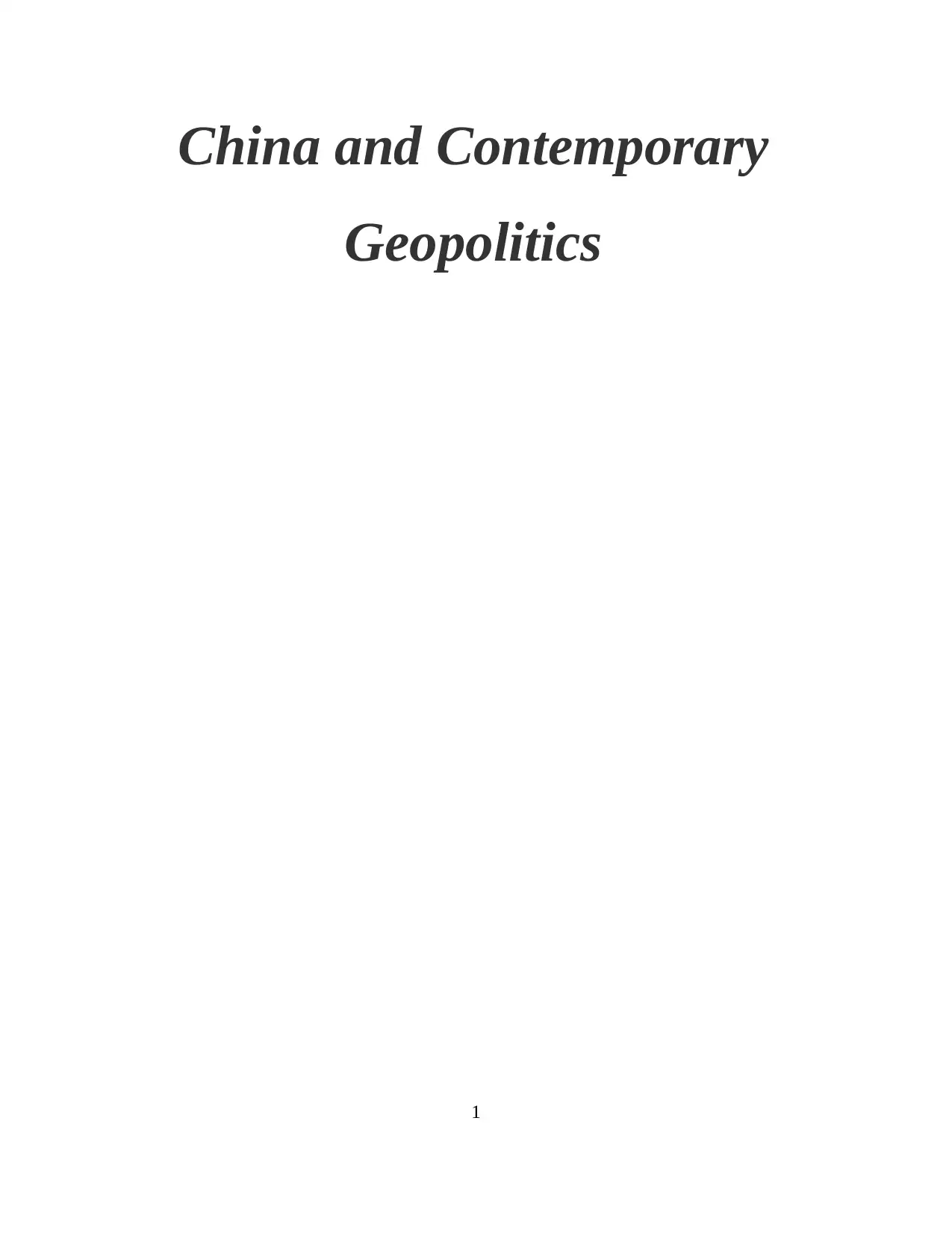
China and Contemporary
Geopolitics
1
Geopolitics
1
Paraphrase This Document
Need a fresh take? Get an instant paraphrase of this document with our AI Paraphraser
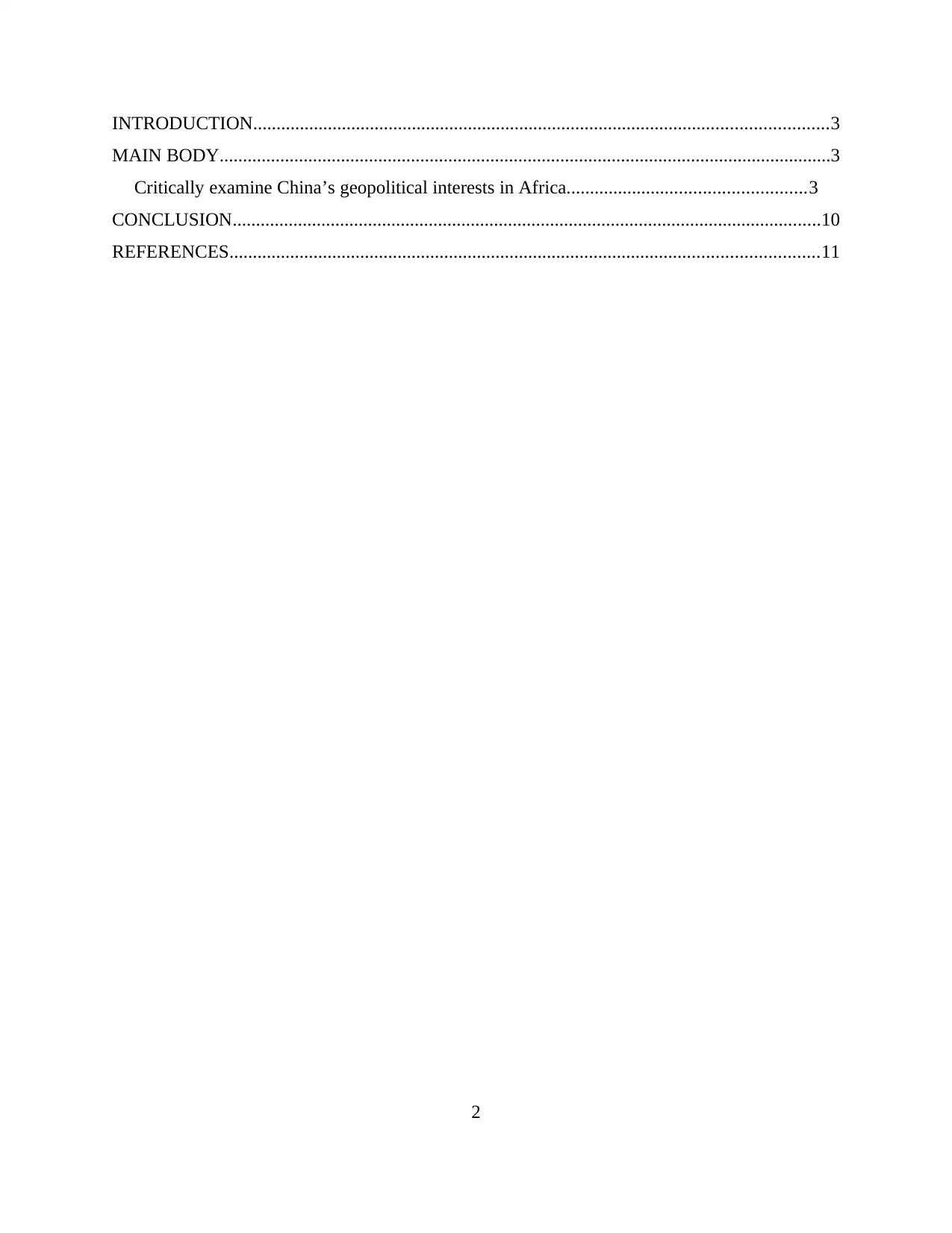
INTRODUCTION...........................................................................................................................3
MAIN BODY...................................................................................................................................3
Critically examine China’s geopolitical interests in Africa...................................................3
CONCLUSION..............................................................................................................................10
REFERENCES..............................................................................................................................11
2
MAIN BODY...................................................................................................................................3
Critically examine China’s geopolitical interests in Africa...................................................3
CONCLUSION..............................................................................................................................10
REFERENCES..............................................................................................................................11
2
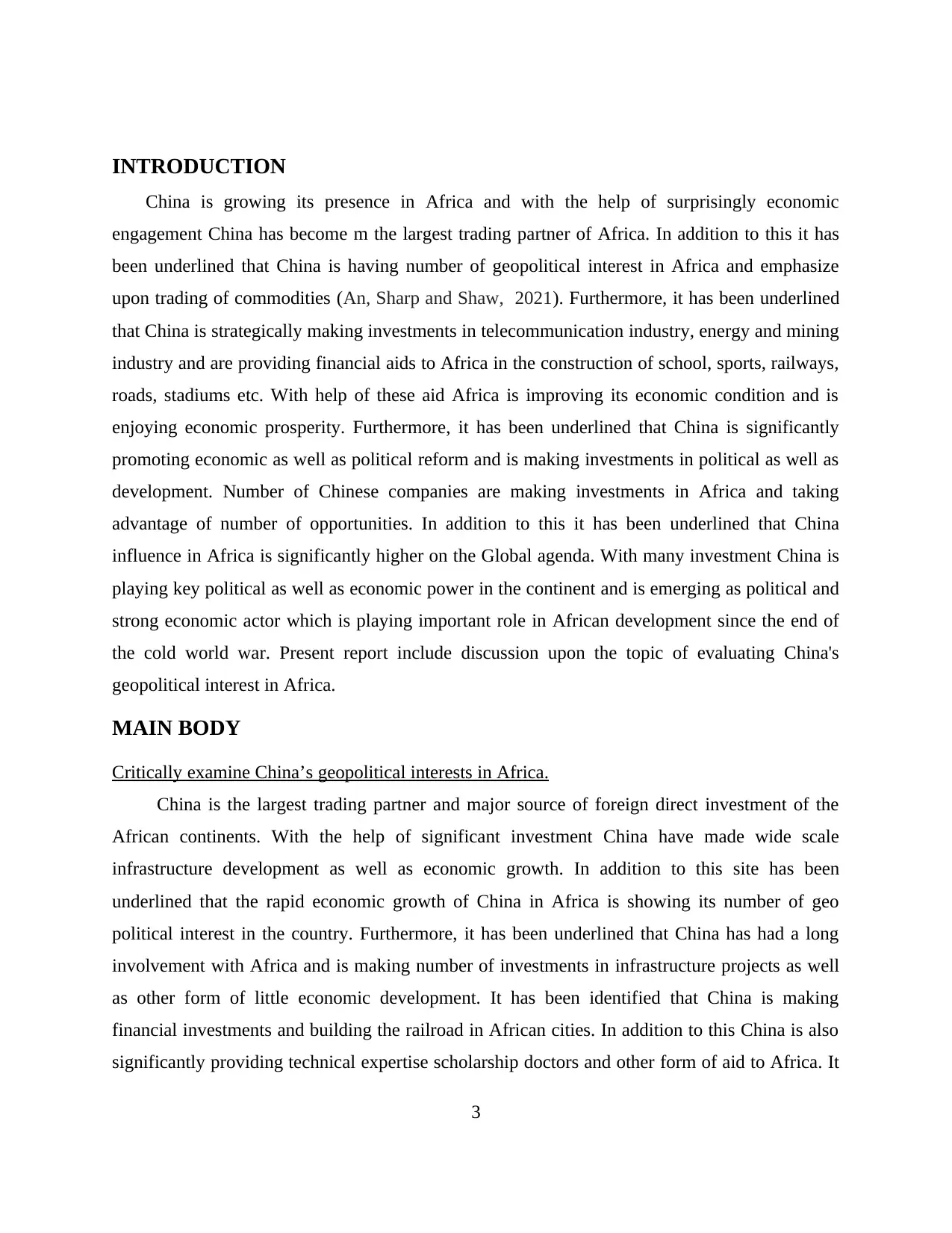
INTRODUCTION
China is growing its presence in Africa and with the help of surprisingly economic
engagement China has become m the largest trading partner of Africa. In addition to this it has
been underlined that China is having number of geopolitical interest in Africa and emphasize
upon trading of commodities (An, Sharp and Shaw, 2021). Furthermore, it has been underlined
that China is strategically making investments in telecommunication industry, energy and mining
industry and are providing financial aids to Africa in the construction of school, sports, railways,
roads, stadiums etc. With help of these aid Africa is improving its economic condition and is
enjoying economic prosperity. Furthermore, it has been underlined that China is significantly
promoting economic as well as political reform and is making investments in political as well as
development. Number of Chinese companies are making investments in Africa and taking
advantage of number of opportunities. In addition to this it has been underlined that China
influence in Africa is significantly higher on the Global agenda. With many investment China is
playing key political as well as economic power in the continent and is emerging as political and
strong economic actor which is playing important role in African development since the end of
the cold world war. Present report include discussion upon the topic of evaluating China's
geopolitical interest in Africa.
MAIN BODY
Critically examine China’s geopolitical interests in Africa.
China is the largest trading partner and major source of foreign direct investment of the
African continents. With the help of significant investment China have made wide scale
infrastructure development as well as economic growth. In addition to this site has been
underlined that the rapid economic growth of China in Africa is showing its number of geo
political interest in the country. Furthermore, it has been underlined that China has had a long
involvement with Africa and is making number of investments in infrastructure projects as well
as other form of little economic development. It has been identified that China is making
financial investments and building the railroad in African cities. In addition to this China is also
significantly providing technical expertise scholarship doctors and other form of aid to Africa. It
3
China is growing its presence in Africa and with the help of surprisingly economic
engagement China has become m the largest trading partner of Africa. In addition to this it has
been underlined that China is having number of geopolitical interest in Africa and emphasize
upon trading of commodities (An, Sharp and Shaw, 2021). Furthermore, it has been underlined
that China is strategically making investments in telecommunication industry, energy and mining
industry and are providing financial aids to Africa in the construction of school, sports, railways,
roads, stadiums etc. With help of these aid Africa is improving its economic condition and is
enjoying economic prosperity. Furthermore, it has been underlined that China is significantly
promoting economic as well as political reform and is making investments in political as well as
development. Number of Chinese companies are making investments in Africa and taking
advantage of number of opportunities. In addition to this it has been underlined that China
influence in Africa is significantly higher on the Global agenda. With many investment China is
playing key political as well as economic power in the continent and is emerging as political and
strong economic actor which is playing important role in African development since the end of
the cold world war. Present report include discussion upon the topic of evaluating China's
geopolitical interest in Africa.
MAIN BODY
Critically examine China’s geopolitical interests in Africa.
China is the largest trading partner and major source of foreign direct investment of the
African continents. With the help of significant investment China have made wide scale
infrastructure development as well as economic growth. In addition to this site has been
underlined that the rapid economic growth of China in Africa is showing its number of geo
political interest in the country. Furthermore, it has been underlined that China has had a long
involvement with Africa and is making number of investments in infrastructure projects as well
as other form of little economic development. It has been identified that China is making
financial investments and building the railroad in African cities. In addition to this China is also
significantly providing technical expertise scholarship doctors and other form of aid to Africa. It
3
⊘ This is a preview!⊘
Do you want full access?
Subscribe today to unlock all pages.

Trusted by 1+ million students worldwide
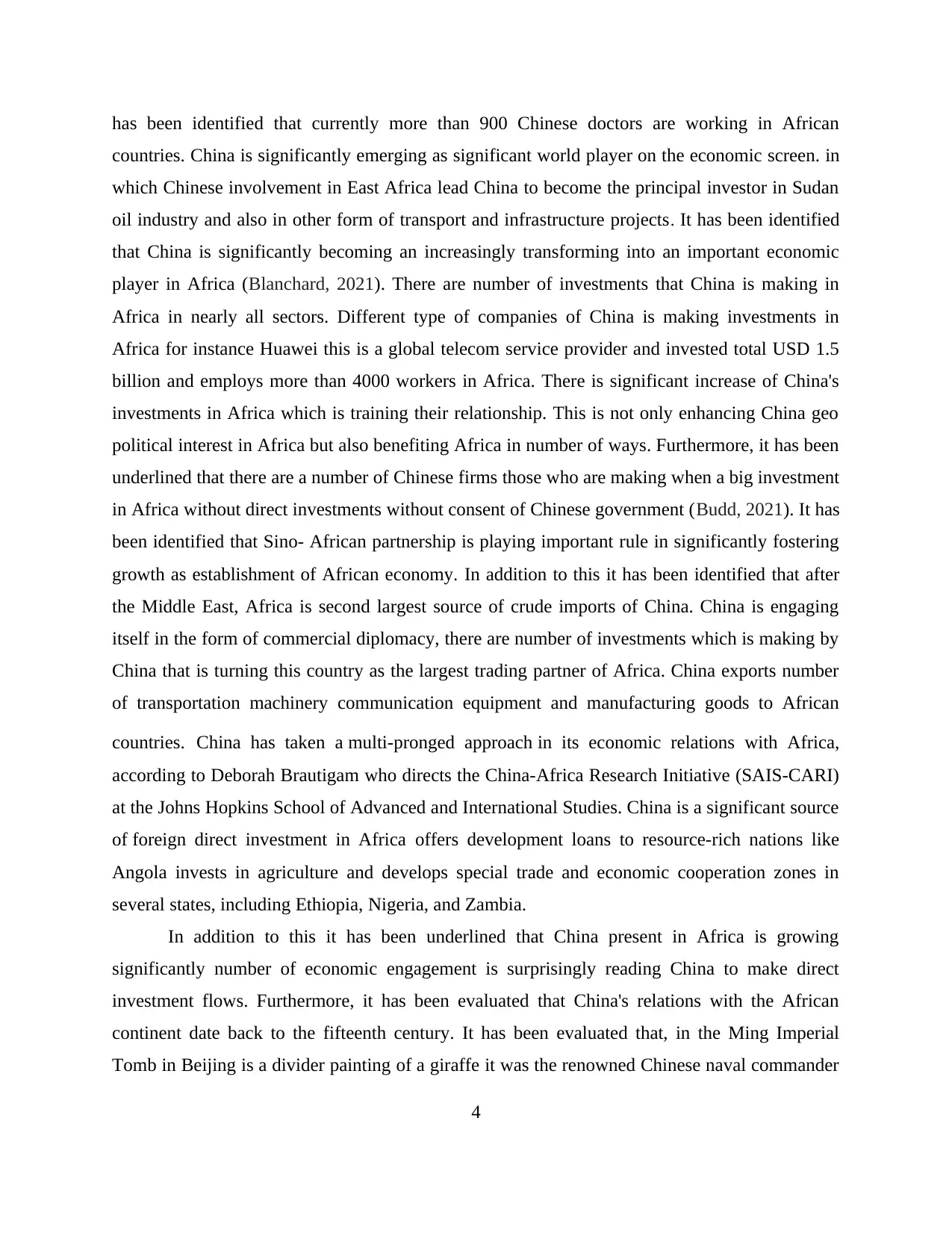
has been identified that currently more than 900 Chinese doctors are working in African
countries. China is significantly emerging as significant world player on the economic screen. in
which Chinese involvement in East Africa lead China to become the principal investor in Sudan
oil industry and also in other form of transport and infrastructure projects. It has been identified
that China is significantly becoming an increasingly transforming into an important economic
player in Africa (Blanchard, 2021). There are number of investments that China is making in
Africa in nearly all sectors. Different type of companies of China is making investments in
Africa for instance Huawei this is a global telecom service provider and invested total USD 1.5
billion and employs more than 4000 workers in Africa. There is significant increase of China's
investments in Africa which is training their relationship. This is not only enhancing China geo
political interest in Africa but also benefiting Africa in number of ways. Furthermore, it has been
underlined that there are a number of Chinese firms those who are making when a big investment
in Africa without direct investments without consent of Chinese government (Budd, 2021). It has
been identified that Sino- African partnership is playing important rule in significantly fostering
growth as establishment of African economy. In addition to this it has been identified that after
the Middle East, Africa is second largest source of crude imports of China. China is engaging
itself in the form of commercial diplomacy, there are number of investments which is making by
China that is turning this country as the largest trading partner of Africa. China exports number
of transportation machinery communication equipment and manufacturing goods to African
countries. China has taken a multi-pronged approach in its economic relations with Africa,
according to Deborah Brautigam who directs the China-Africa Research Initiative (SAIS-CARI)
at the Johns Hopkins School of Advanced and International Studies. China is a significant source
of foreign direct investment in Africa offers development loans to resource-rich nations like
Angola invests in agriculture and develops special trade and economic cooperation zones in
several states, including Ethiopia, Nigeria, and Zambia.
In addition to this it has been underlined that China present in Africa is growing
significantly number of economic engagement is surprisingly reading China to make direct
investment flows. Furthermore, it has been evaluated that China's relations with the African
continent date back to the fifteenth century. It has been evaluated that, in the Ming Imperial
Tomb in Beijing is a divider painting of a giraffe it was the renowned Chinese naval commander
4
countries. China is significantly emerging as significant world player on the economic screen. in
which Chinese involvement in East Africa lead China to become the principal investor in Sudan
oil industry and also in other form of transport and infrastructure projects. It has been identified
that China is significantly becoming an increasingly transforming into an important economic
player in Africa (Blanchard, 2021). There are number of investments that China is making in
Africa in nearly all sectors. Different type of companies of China is making investments in
Africa for instance Huawei this is a global telecom service provider and invested total USD 1.5
billion and employs more than 4000 workers in Africa. There is significant increase of China's
investments in Africa which is training their relationship. This is not only enhancing China geo
political interest in Africa but also benefiting Africa in number of ways. Furthermore, it has been
underlined that there are a number of Chinese firms those who are making when a big investment
in Africa without direct investments without consent of Chinese government (Budd, 2021). It has
been identified that Sino- African partnership is playing important rule in significantly fostering
growth as establishment of African economy. In addition to this it has been identified that after
the Middle East, Africa is second largest source of crude imports of China. China is engaging
itself in the form of commercial diplomacy, there are number of investments which is making by
China that is turning this country as the largest trading partner of Africa. China exports number
of transportation machinery communication equipment and manufacturing goods to African
countries. China has taken a multi-pronged approach in its economic relations with Africa,
according to Deborah Brautigam who directs the China-Africa Research Initiative (SAIS-CARI)
at the Johns Hopkins School of Advanced and International Studies. China is a significant source
of foreign direct investment in Africa offers development loans to resource-rich nations like
Angola invests in agriculture and develops special trade and economic cooperation zones in
several states, including Ethiopia, Nigeria, and Zambia.
In addition to this it has been underlined that China present in Africa is growing
significantly number of economic engagement is surprisingly reading China to make direct
investment flows. Furthermore, it has been evaluated that China's relations with the African
continent date back to the fifteenth century. It has been evaluated that, in the Ming Imperial
Tomb in Beijing is a divider painting of a giraffe it was the renowned Chinese naval commander
4
Paraphrase This Document
Need a fresh take? Get an instant paraphrase of this document with our AI Paraphraser
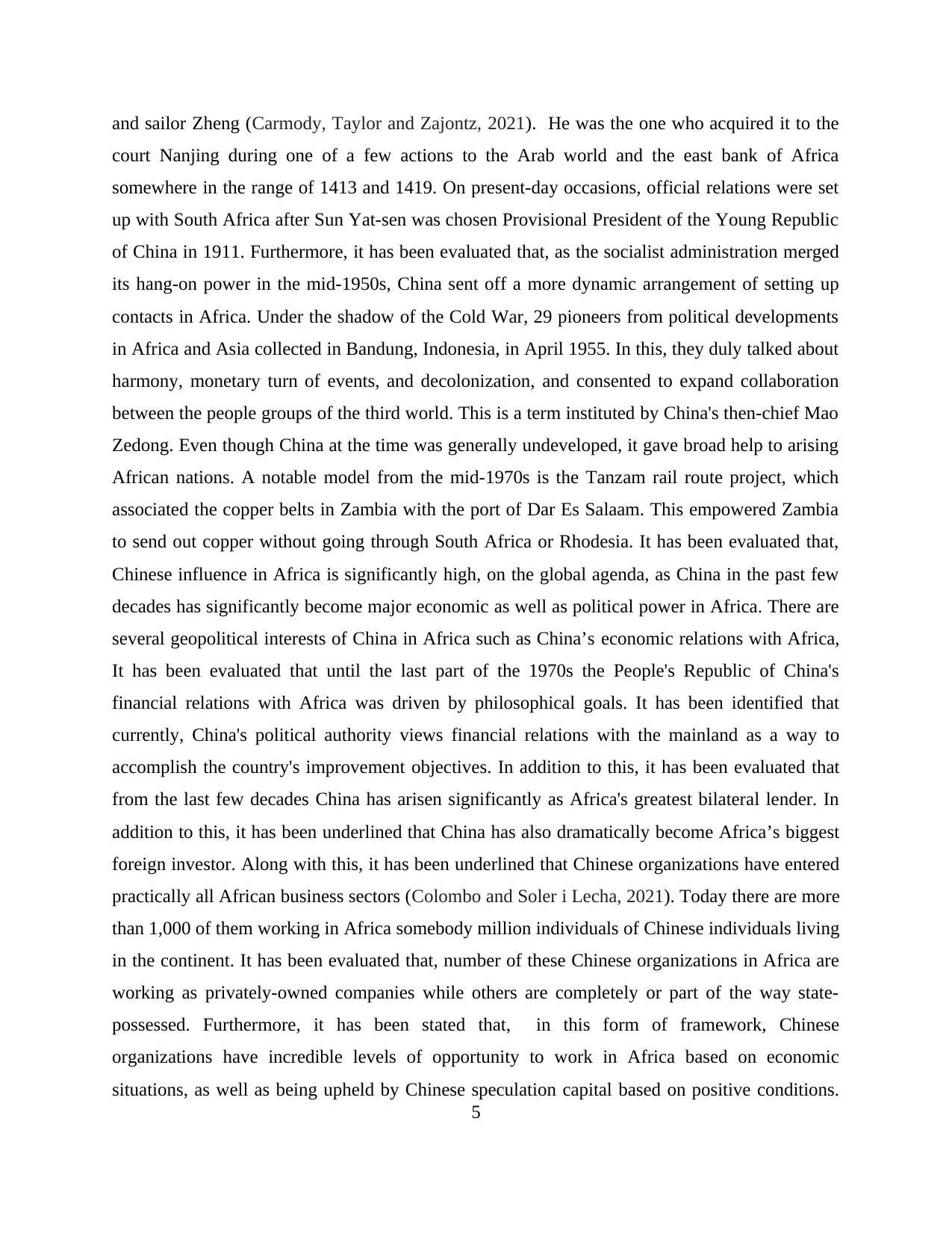
and sailor Zheng (Carmody, Taylor and Zajontz, 2021). He was the one who acquired it to the
court Nanjing during one of a few actions to the Arab world and the east bank of Africa
somewhere in the range of 1413 and 1419. On present-day occasions, official relations were set
up with South Africa after Sun Yat-sen was chosen Provisional President of the Young Republic
of China in 1911. Furthermore, it has been evaluated that, as the socialist administration merged
its hang-on power in the mid-1950s, China sent off a more dynamic arrangement of setting up
contacts in Africa. Under the shadow of the Cold War, 29 pioneers from political developments
in Africa and Asia collected in Bandung, Indonesia, in April 1955. In this, they duly talked about
harmony, monetary turn of events, and decolonization, and consented to expand collaboration
between the people groups of the third world. This is a term instituted by China's then-chief Mao
Zedong. Even though China at the time was generally undeveloped, it gave broad help to arising
African nations. A notable model from the mid-1970s is the Tanzam rail route project, which
associated the copper belts in Zambia with the port of Dar Es Salaam. This empowered Zambia
to send out copper without going through South Africa or Rhodesia. It has been evaluated that,
Chinese influence in Africa is significantly high, on the global agenda, as China in the past few
decades has significantly become major economic as well as political power in Africa. There are
several geopolitical interests of China in Africa such as China’s economic relations with Africa,
It has been evaluated that until the last part of the 1970s the People's Republic of China's
financial relations with Africa was driven by philosophical goals. It has been identified that
currently, China's political authority views financial relations with the mainland as a way to
accomplish the country's improvement objectives. In addition to this, it has been evaluated that
from the last few decades China has arisen significantly as Africa's greatest bilateral lender. In
addition to this, it has been underlined that China has also dramatically become Africa’s biggest
foreign investor. Along with this, it has been underlined that Chinese organizations have entered
practically all African business sectors (Colombo and Soler i Lecha, 2021). Today there are more
than 1,000 of them working in Africa somebody million individuals of Chinese individuals living
in the continent. It has been evaluated that, number of these Chinese organizations in Africa are
working as privately-owned companies while others are completely or part of the way state-
possessed. Furthermore, it has been stated that, in this form of framework, Chinese
organizations have incredible levels of opportunity to work in Africa based on economic
situations, as well as being upheld by Chinese speculation capital based on positive conditions.
5
court Nanjing during one of a few actions to the Arab world and the east bank of Africa
somewhere in the range of 1413 and 1419. On present-day occasions, official relations were set
up with South Africa after Sun Yat-sen was chosen Provisional President of the Young Republic
of China in 1911. Furthermore, it has been evaluated that, as the socialist administration merged
its hang-on power in the mid-1950s, China sent off a more dynamic arrangement of setting up
contacts in Africa. Under the shadow of the Cold War, 29 pioneers from political developments
in Africa and Asia collected in Bandung, Indonesia, in April 1955. In this, they duly talked about
harmony, monetary turn of events, and decolonization, and consented to expand collaboration
between the people groups of the third world. This is a term instituted by China's then-chief Mao
Zedong. Even though China at the time was generally undeveloped, it gave broad help to arising
African nations. A notable model from the mid-1970s is the Tanzam rail route project, which
associated the copper belts in Zambia with the port of Dar Es Salaam. This empowered Zambia
to send out copper without going through South Africa or Rhodesia. It has been evaluated that,
Chinese influence in Africa is significantly high, on the global agenda, as China in the past few
decades has significantly become major economic as well as political power in Africa. There are
several geopolitical interests of China in Africa such as China’s economic relations with Africa,
It has been evaluated that until the last part of the 1970s the People's Republic of China's
financial relations with Africa was driven by philosophical goals. It has been identified that
currently, China's political authority views financial relations with the mainland as a way to
accomplish the country's improvement objectives. In addition to this, it has been evaluated that
from the last few decades China has arisen significantly as Africa's greatest bilateral lender. In
addition to this, it has been underlined that China has also dramatically become Africa’s biggest
foreign investor. Along with this, it has been underlined that Chinese organizations have entered
practically all African business sectors (Colombo and Soler i Lecha, 2021). Today there are more
than 1,000 of them working in Africa somebody million individuals of Chinese individuals living
in the continent. It has been evaluated that, number of these Chinese organizations in Africa are
working as privately-owned companies while others are completely or part of the way state-
possessed. Furthermore, it has been stated that, in this form of framework, Chinese
organizations have incredible levels of opportunity to work in Africa based on economic
situations, as well as being upheld by Chinese speculation capital based on positive conditions.
5
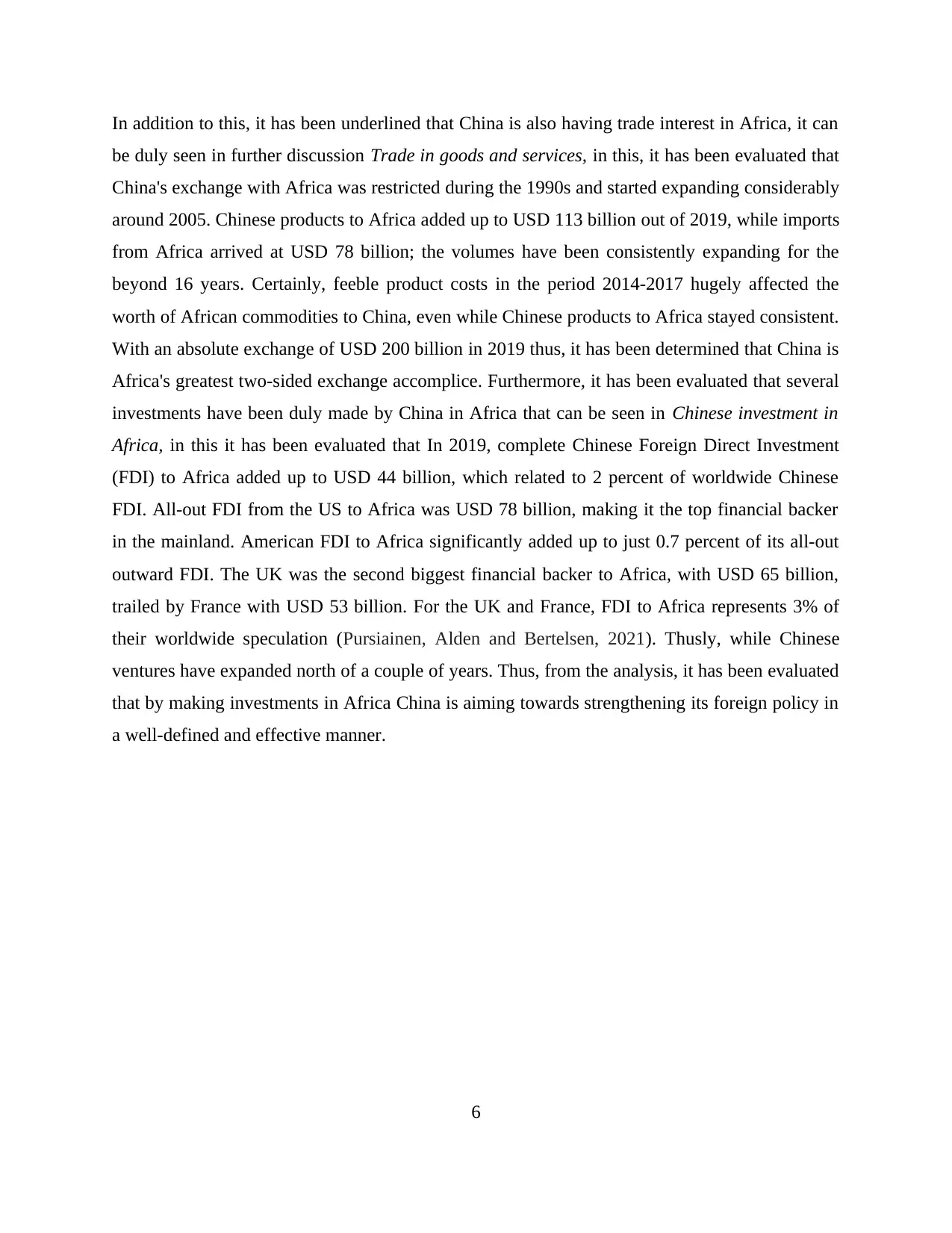
In addition to this, it has been underlined that China is also having trade interest in Africa, it can
be duly seen in further discussion Trade in goods and services, in this, it has been evaluated that
China's exchange with Africa was restricted during the 1990s and started expanding considerably
around 2005. Chinese products to Africa added up to USD 113 billion out of 2019, while imports
from Africa arrived at USD 78 billion; the volumes have been consistently expanding for the
beyond 16 years. Certainly, feeble product costs in the period 2014-2017 hugely affected the
worth of African commodities to China, even while Chinese products to Africa stayed consistent.
With an absolute exchange of USD 200 billion in 2019 thus, it has been determined that China is
Africa's greatest two-sided exchange accomplice. Furthermore, it has been evaluated that several
investments have been duly made by China in Africa that can be seen in Chinese investment in
Africa, in this it has been evaluated that In 2019, complete Chinese Foreign Direct Investment
(FDI) to Africa added up to USD 44 billion, which related to 2 percent of worldwide Chinese
FDI. All-out FDI from the US to Africa was USD 78 billion, making it the top financial backer
in the mainland. American FDI to Africa significantly added up to just 0.7 percent of its all-out
outward FDI. The UK was the second biggest financial backer to Africa, with USD 65 billion,
trailed by France with USD 53 billion. For the UK and France, FDI to Africa represents 3% of
their worldwide speculation (Pursiainen, Alden and Bertelsen, 2021). Thusly, while Chinese
ventures have expanded north of a couple of years. Thus, from the analysis, it has been evaluated
that by making investments in Africa China is aiming towards strengthening its foreign policy in
a well-defined and effective manner.
6
be duly seen in further discussion Trade in goods and services, in this, it has been evaluated that
China's exchange with Africa was restricted during the 1990s and started expanding considerably
around 2005. Chinese products to Africa added up to USD 113 billion out of 2019, while imports
from Africa arrived at USD 78 billion; the volumes have been consistently expanding for the
beyond 16 years. Certainly, feeble product costs in the period 2014-2017 hugely affected the
worth of African commodities to China, even while Chinese products to Africa stayed consistent.
With an absolute exchange of USD 200 billion in 2019 thus, it has been determined that China is
Africa's greatest two-sided exchange accomplice. Furthermore, it has been evaluated that several
investments have been duly made by China in Africa that can be seen in Chinese investment in
Africa, in this it has been evaluated that In 2019, complete Chinese Foreign Direct Investment
(FDI) to Africa added up to USD 44 billion, which related to 2 percent of worldwide Chinese
FDI. All-out FDI from the US to Africa was USD 78 billion, making it the top financial backer
in the mainland. American FDI to Africa significantly added up to just 0.7 percent of its all-out
outward FDI. The UK was the second biggest financial backer to Africa, with USD 65 billion,
trailed by France with USD 53 billion. For the UK and France, FDI to Africa represents 3% of
their worldwide speculation (Pursiainen, Alden and Bertelsen, 2021). Thusly, while Chinese
ventures have expanded north of a couple of years. Thus, from the analysis, it has been evaluated
that by making investments in Africa China is aiming towards strengthening its foreign policy in
a well-defined and effective manner.
6
⊘ This is a preview!⊘
Do you want full access?
Subscribe today to unlock all pages.

Trusted by 1+ million students worldwide
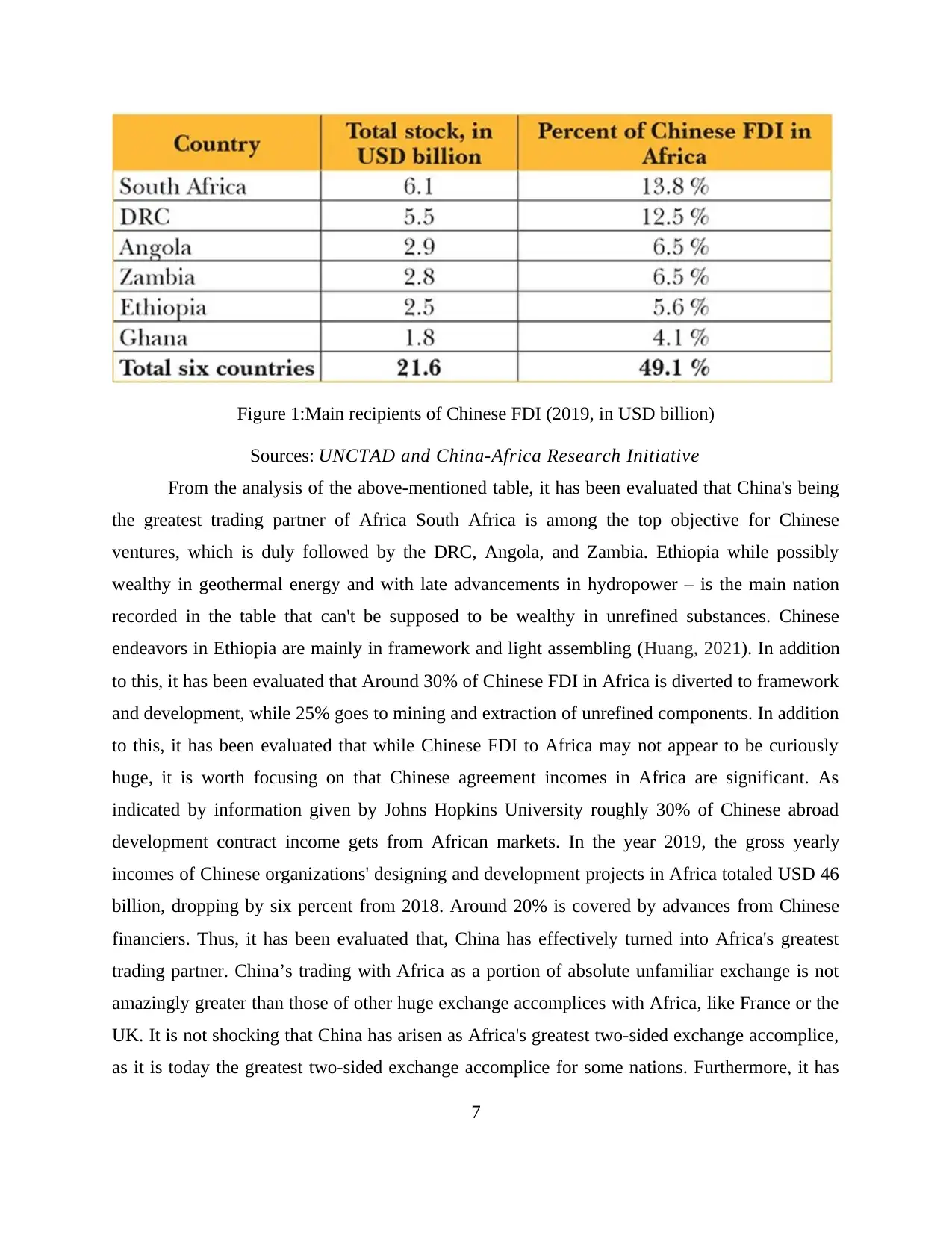
Figure 1:Main recipients of Chinese FDI (2019, in USD billion)
Sources: UNCTAD and China-Africa Research Initiative
From the analysis of the above-mentioned table, it has been evaluated that China's being
the greatest trading partner of Africa South Africa is among the top objective for Chinese
ventures, which is duly followed by the DRC, Angola, and Zambia. Ethiopia while possibly
wealthy in geothermal energy and with late advancements in hydropower – is the main nation
recorded in the table that can't be supposed to be wealthy in unrefined substances. Chinese
endeavors in Ethiopia are mainly in framework and light assembling (Huang, 2021). In addition
to this, it has been evaluated that Around 30% of Chinese FDI in Africa is diverted to framework
and development, while 25% goes to mining and extraction of unrefined components. In addition
to this, it has been evaluated that while Chinese FDI to Africa may not appear to be curiously
huge, it is worth focusing on that Chinese agreement incomes in Africa are significant. As
indicated by information given by Johns Hopkins University roughly 30% of Chinese abroad
development contract income gets from African markets. In the year 2019, the gross yearly
incomes of Chinese organizations' designing and development projects in Africa totaled USD 46
billion, dropping by six percent from 2018. Around 20% is covered by advances from Chinese
financiers. Thus, it has been evaluated that, China has effectively turned into Africa's greatest
trading partner. China’s trading with Africa as a portion of absolute unfamiliar exchange is not
amazingly greater than those of other huge exchange accomplices with Africa, like France or the
UK. It is not shocking that China has arisen as Africa's greatest two-sided exchange accomplice,
as it is today the greatest two-sided exchange accomplice for some nations. Furthermore, it has
7
Sources: UNCTAD and China-Africa Research Initiative
From the analysis of the above-mentioned table, it has been evaluated that China's being
the greatest trading partner of Africa South Africa is among the top objective for Chinese
ventures, which is duly followed by the DRC, Angola, and Zambia. Ethiopia while possibly
wealthy in geothermal energy and with late advancements in hydropower – is the main nation
recorded in the table that can't be supposed to be wealthy in unrefined substances. Chinese
endeavors in Ethiopia are mainly in framework and light assembling (Huang, 2021). In addition
to this, it has been evaluated that Around 30% of Chinese FDI in Africa is diverted to framework
and development, while 25% goes to mining and extraction of unrefined components. In addition
to this, it has been evaluated that while Chinese FDI to Africa may not appear to be curiously
huge, it is worth focusing on that Chinese agreement incomes in Africa are significant. As
indicated by information given by Johns Hopkins University roughly 30% of Chinese abroad
development contract income gets from African markets. In the year 2019, the gross yearly
incomes of Chinese organizations' designing and development projects in Africa totaled USD 46
billion, dropping by six percent from 2018. Around 20% is covered by advances from Chinese
financiers. Thus, it has been evaluated that, China has effectively turned into Africa's greatest
trading partner. China’s trading with Africa as a portion of absolute unfamiliar exchange is not
amazingly greater than those of other huge exchange accomplices with Africa, like France or the
UK. It is not shocking that China has arisen as Africa's greatest two-sided exchange accomplice,
as it is today the greatest two-sided exchange accomplice for some nations. Furthermore, it has
7
Paraphrase This Document
Need a fresh take? Get an instant paraphrase of this document with our AI Paraphraser
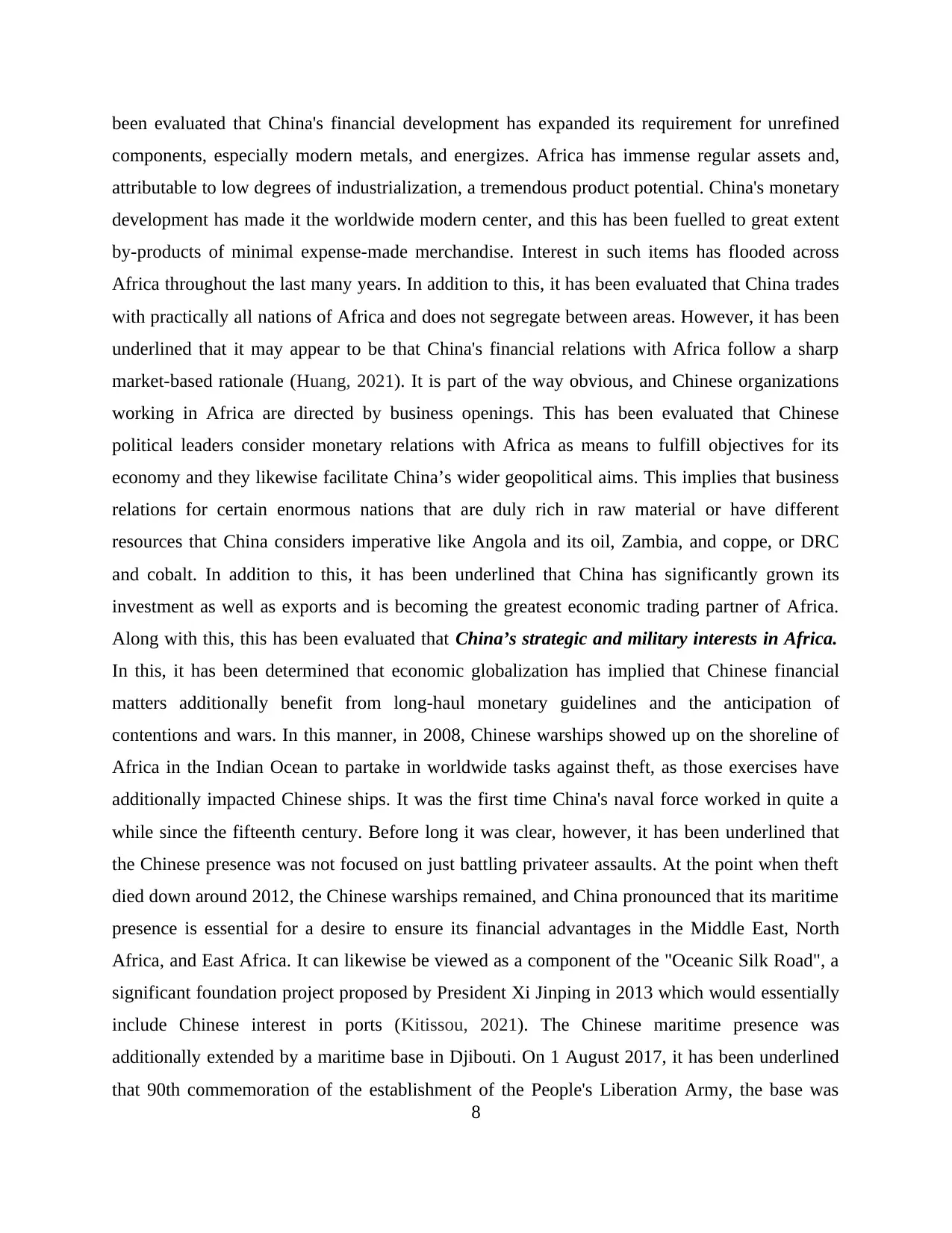
been evaluated that China's financial development has expanded its requirement for unrefined
components, especially modern metals, and energizes. Africa has immense regular assets and,
attributable to low degrees of industrialization, a tremendous product potential. China's monetary
development has made it the worldwide modern center, and this has been fuelled to great extent
by-products of minimal expense-made merchandise. Interest in such items has flooded across
Africa throughout the last many years. In addition to this, it has been evaluated that China trades
with practically all nations of Africa and does not segregate between areas. However, it has been
underlined that it may appear to be that China's financial relations with Africa follow a sharp
market-based rationale (Huang, 2021). It is part of the way obvious, and Chinese organizations
working in Africa are directed by business openings. This has been evaluated that Chinese
political leaders consider monetary relations with Africa as means to fulfill objectives for its
economy and they likewise facilitate China’s wider geopolitical aims. This implies that business
relations for certain enormous nations that are duly rich in raw material or have different
resources that China considers imperative like Angola and its oil, Zambia, and coppe, or DRC
and cobalt. In addition to this, it has been underlined that China has significantly grown its
investment as well as exports and is becoming the greatest economic trading partner of Africa.
Along with this, this has been evaluated that China’s strategic and military interests in Africa.
In this, it has been determined that economic globalization has implied that Chinese financial
matters additionally benefit from long-haul monetary guidelines and the anticipation of
contentions and wars. In this manner, in 2008, Chinese warships showed up on the shoreline of
Africa in the Indian Ocean to partake in worldwide tasks against theft, as those exercises have
additionally impacted Chinese ships. It was the first time China's naval force worked in quite a
while since the fifteenth century. Before long it was clear, however, it has been underlined that
the Chinese presence was not focused on just battling privateer assaults. At the point when theft
died down around 2012, the Chinese warships remained, and China pronounced that its maritime
presence is essential for a desire to ensure its financial advantages in the Middle East, North
Africa, and East Africa. It can likewise be viewed as a component of the "Oceanic Silk Road", a
significant foundation project proposed by President Xi Jinping in 2013 which would essentially
include Chinese interest in ports (Kitissou, 2021). The Chinese maritime presence was
additionally extended by a maritime base in Djibouti. On 1 August 2017, it has been underlined
that 90th commemoration of the establishment of the People's Liberation Army, the base was
8
components, especially modern metals, and energizes. Africa has immense regular assets and,
attributable to low degrees of industrialization, a tremendous product potential. China's monetary
development has made it the worldwide modern center, and this has been fuelled to great extent
by-products of minimal expense-made merchandise. Interest in such items has flooded across
Africa throughout the last many years. In addition to this, it has been evaluated that China trades
with practically all nations of Africa and does not segregate between areas. However, it has been
underlined that it may appear to be that China's financial relations with Africa follow a sharp
market-based rationale (Huang, 2021). It is part of the way obvious, and Chinese organizations
working in Africa are directed by business openings. This has been evaluated that Chinese
political leaders consider monetary relations with Africa as means to fulfill objectives for its
economy and they likewise facilitate China’s wider geopolitical aims. This implies that business
relations for certain enormous nations that are duly rich in raw material or have different
resources that China considers imperative like Angola and its oil, Zambia, and coppe, or DRC
and cobalt. In addition to this, it has been underlined that China has significantly grown its
investment as well as exports and is becoming the greatest economic trading partner of Africa.
Along with this, this has been evaluated that China’s strategic and military interests in Africa.
In this, it has been determined that economic globalization has implied that Chinese financial
matters additionally benefit from long-haul monetary guidelines and the anticipation of
contentions and wars. In this manner, in 2008, Chinese warships showed up on the shoreline of
Africa in the Indian Ocean to partake in worldwide tasks against theft, as those exercises have
additionally impacted Chinese ships. It was the first time China's naval force worked in quite a
while since the fifteenth century. Before long it was clear, however, it has been underlined that
the Chinese presence was not focused on just battling privateer assaults. At the point when theft
died down around 2012, the Chinese warships remained, and China pronounced that its maritime
presence is essential for a desire to ensure its financial advantages in the Middle East, North
Africa, and East Africa. It can likewise be viewed as a component of the "Oceanic Silk Road", a
significant foundation project proposed by President Xi Jinping in 2013 which would essentially
include Chinese interest in ports (Kitissou, 2021). The Chinese maritime presence was
additionally extended by a maritime base in Djibouti. On 1 August 2017, it has been underlined
that 90th commemoration of the establishment of the People's Liberation Army, the base was
8
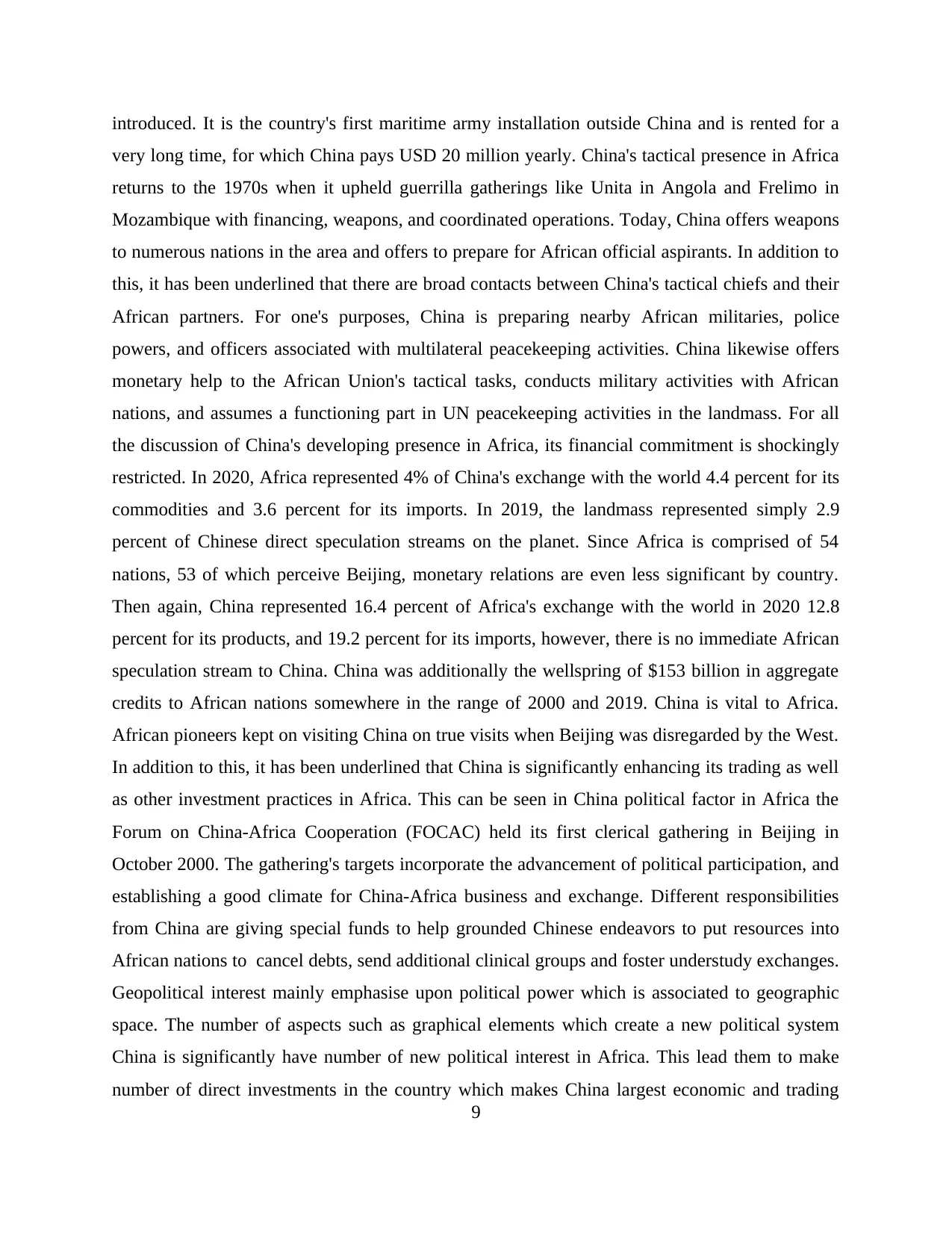
introduced. It is the country's first maritime army installation outside China and is rented for a
very long time, for which China pays USD 20 million yearly. China's tactical presence in Africa
returns to the 1970s when it upheld guerrilla gatherings like Unita in Angola and Frelimo in
Mozambique with financing, weapons, and coordinated operations. Today, China offers weapons
to numerous nations in the area and offers to prepare for African official aspirants. In addition to
this, it has been underlined that there are broad contacts between China's tactical chiefs and their
African partners. For one's purposes, China is preparing nearby African militaries, police
powers, and officers associated with multilateral peacekeeping activities. China likewise offers
monetary help to the African Union's tactical tasks, conducts military activities with African
nations, and assumes a functioning part in UN peacekeeping activities in the landmass. For all
the discussion of China's developing presence in Africa, its financial commitment is shockingly
restricted. In 2020, Africa represented 4% of China's exchange with the world 4.4 percent for its
commodities and 3.6 percent for its imports. In 2019, the landmass represented simply 2.9
percent of Chinese direct speculation streams on the planet. Since Africa is comprised of 54
nations, 53 of which perceive Beijing, monetary relations are even less significant by country.
Then again, China represented 16.4 percent of Africa's exchange with the world in 2020 12.8
percent for its products, and 19.2 percent for its imports, however, there is no immediate African
speculation stream to China. China was additionally the wellspring of $153 billion in aggregate
credits to African nations somewhere in the range of 2000 and 2019. China is vital to Africa.
African pioneers kept on visiting China on true visits when Beijing was disregarded by the West.
In addition to this, it has been underlined that China is significantly enhancing its trading as well
as other investment practices in Africa. This can be seen in China political factor in Africa the
Forum on China-Africa Cooperation (FOCAC) held its first clerical gathering in Beijing in
October 2000. The gathering's targets incorporate the advancement of political participation, and
establishing a good climate for China-Africa business and exchange. Different responsibilities
from China are giving special funds to help grounded Chinese endeavors to put resources into
African nations to cancel debts, send additional clinical groups and foster understudy exchanges.
Geopolitical interest mainly emphasise upon political power which is associated to geographic
space. The number of aspects such as graphical elements which create a new political system
China is significantly have number of new political interest in Africa. This lead them to make
number of direct investments in the country which makes China largest economic and trading
9
very long time, for which China pays USD 20 million yearly. China's tactical presence in Africa
returns to the 1970s when it upheld guerrilla gatherings like Unita in Angola and Frelimo in
Mozambique with financing, weapons, and coordinated operations. Today, China offers weapons
to numerous nations in the area and offers to prepare for African official aspirants. In addition to
this, it has been underlined that there are broad contacts between China's tactical chiefs and their
African partners. For one's purposes, China is preparing nearby African militaries, police
powers, and officers associated with multilateral peacekeeping activities. China likewise offers
monetary help to the African Union's tactical tasks, conducts military activities with African
nations, and assumes a functioning part in UN peacekeeping activities in the landmass. For all
the discussion of China's developing presence in Africa, its financial commitment is shockingly
restricted. In 2020, Africa represented 4% of China's exchange with the world 4.4 percent for its
commodities and 3.6 percent for its imports. In 2019, the landmass represented simply 2.9
percent of Chinese direct speculation streams on the planet. Since Africa is comprised of 54
nations, 53 of which perceive Beijing, monetary relations are even less significant by country.
Then again, China represented 16.4 percent of Africa's exchange with the world in 2020 12.8
percent for its products, and 19.2 percent for its imports, however, there is no immediate African
speculation stream to China. China was additionally the wellspring of $153 billion in aggregate
credits to African nations somewhere in the range of 2000 and 2019. China is vital to Africa.
African pioneers kept on visiting China on true visits when Beijing was disregarded by the West.
In addition to this, it has been underlined that China is significantly enhancing its trading as well
as other investment practices in Africa. This can be seen in China political factor in Africa the
Forum on China-Africa Cooperation (FOCAC) held its first clerical gathering in Beijing in
October 2000. The gathering's targets incorporate the advancement of political participation, and
establishing a good climate for China-Africa business and exchange. Different responsibilities
from China are giving special funds to help grounded Chinese endeavors to put resources into
African nations to cancel debts, send additional clinical groups and foster understudy exchanges.
Geopolitical interest mainly emphasise upon political power which is associated to geographic
space. The number of aspects such as graphical elements which create a new political system
China is significantly have number of new political interest in Africa. This lead them to make
number of direct investments in the country which makes China largest economic and trading
9
⊘ This is a preview!⊘
Do you want full access?
Subscribe today to unlock all pages.

Trusted by 1+ million students worldwide
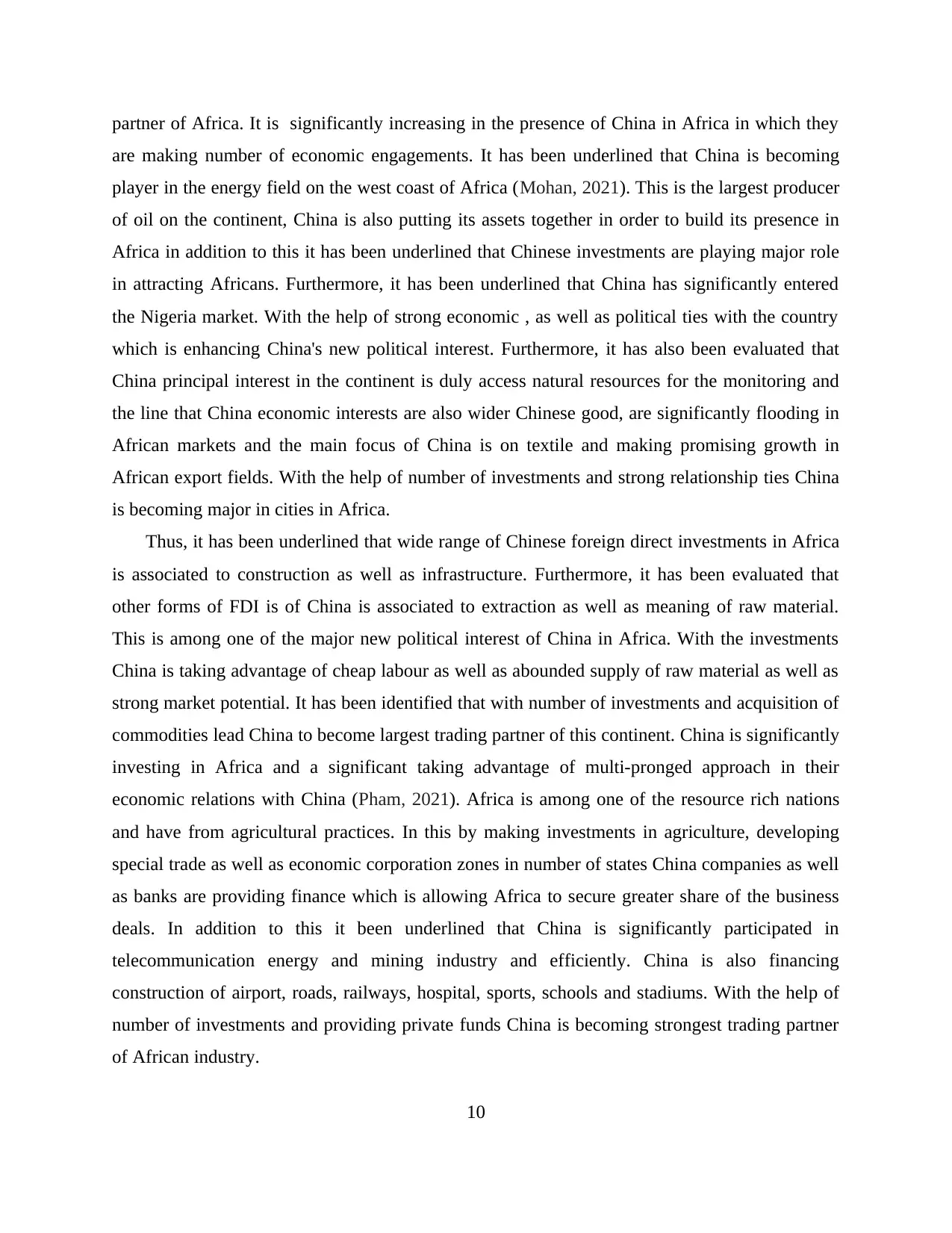
partner of Africa. It is significantly increasing in the presence of China in Africa in which they
are making number of economic engagements. It has been underlined that China is becoming
player in the energy field on the west coast of Africa (Mohan, 2021). This is the largest producer
of oil on the continent, China is also putting its assets together in order to build its presence in
Africa in addition to this it has been underlined that Chinese investments are playing major role
in attracting Africans. Furthermore, it has been underlined that China has significantly entered
the Nigeria market. With the help of strong economic , as well as political ties with the country
which is enhancing China's new political interest. Furthermore, it has also been evaluated that
China principal interest in the continent is duly access natural resources for the monitoring and
the line that China economic interests are also wider Chinese good, are significantly flooding in
African markets and the main focus of China is on textile and making promising growth in
African export fields. With the help of number of investments and strong relationship ties China
is becoming major in cities in Africa.
Thus, it has been underlined that wide range of Chinese foreign direct investments in Africa
is associated to construction as well as infrastructure. Furthermore, it has been evaluated that
other forms of FDI is of China is associated to extraction as well as meaning of raw material.
This is among one of the major new political interest of China in Africa. With the investments
China is taking advantage of cheap labour as well as abounded supply of raw material as well as
strong market potential. It has been identified that with number of investments and acquisition of
commodities lead China to become largest trading partner of this continent. China is significantly
investing in Africa and a significant taking advantage of multi-pronged approach in their
economic relations with China (Pham, 2021). Africa is among one of the resource rich nations
and have from agricultural practices. In this by making investments in agriculture, developing
special trade as well as economic corporation zones in number of states China companies as well
as banks are providing finance which is allowing Africa to secure greater share of the business
deals. In addition to this it been underlined that China is significantly participated in
telecommunication energy and mining industry and efficiently. China is also financing
construction of airport, roads, railways, hospital, sports, schools and stadiums. With the help of
number of investments and providing private funds China is becoming strongest trading partner
of African industry.
10
are making number of economic engagements. It has been underlined that China is becoming
player in the energy field on the west coast of Africa (Mohan, 2021). This is the largest producer
of oil on the continent, China is also putting its assets together in order to build its presence in
Africa in addition to this it has been underlined that Chinese investments are playing major role
in attracting Africans. Furthermore, it has been underlined that China has significantly entered
the Nigeria market. With the help of strong economic , as well as political ties with the country
which is enhancing China's new political interest. Furthermore, it has also been evaluated that
China principal interest in the continent is duly access natural resources for the monitoring and
the line that China economic interests are also wider Chinese good, are significantly flooding in
African markets and the main focus of China is on textile and making promising growth in
African export fields. With the help of number of investments and strong relationship ties China
is becoming major in cities in Africa.
Thus, it has been underlined that wide range of Chinese foreign direct investments in Africa
is associated to construction as well as infrastructure. Furthermore, it has been evaluated that
other forms of FDI is of China is associated to extraction as well as meaning of raw material.
This is among one of the major new political interest of China in Africa. With the investments
China is taking advantage of cheap labour as well as abounded supply of raw material as well as
strong market potential. It has been identified that with number of investments and acquisition of
commodities lead China to become largest trading partner of this continent. China is significantly
investing in Africa and a significant taking advantage of multi-pronged approach in their
economic relations with China (Pham, 2021). Africa is among one of the resource rich nations
and have from agricultural practices. In this by making investments in agriculture, developing
special trade as well as economic corporation zones in number of states China companies as well
as banks are providing finance which is allowing Africa to secure greater share of the business
deals. In addition to this it been underlined that China is significantly participated in
telecommunication energy and mining industry and efficiently. China is also financing
construction of airport, roads, railways, hospital, sports, schools and stadiums. With the help of
number of investments and providing private funds China is becoming strongest trading partner
of African industry.
10
Paraphrase This Document
Need a fresh take? Get an instant paraphrase of this document with our AI Paraphraser
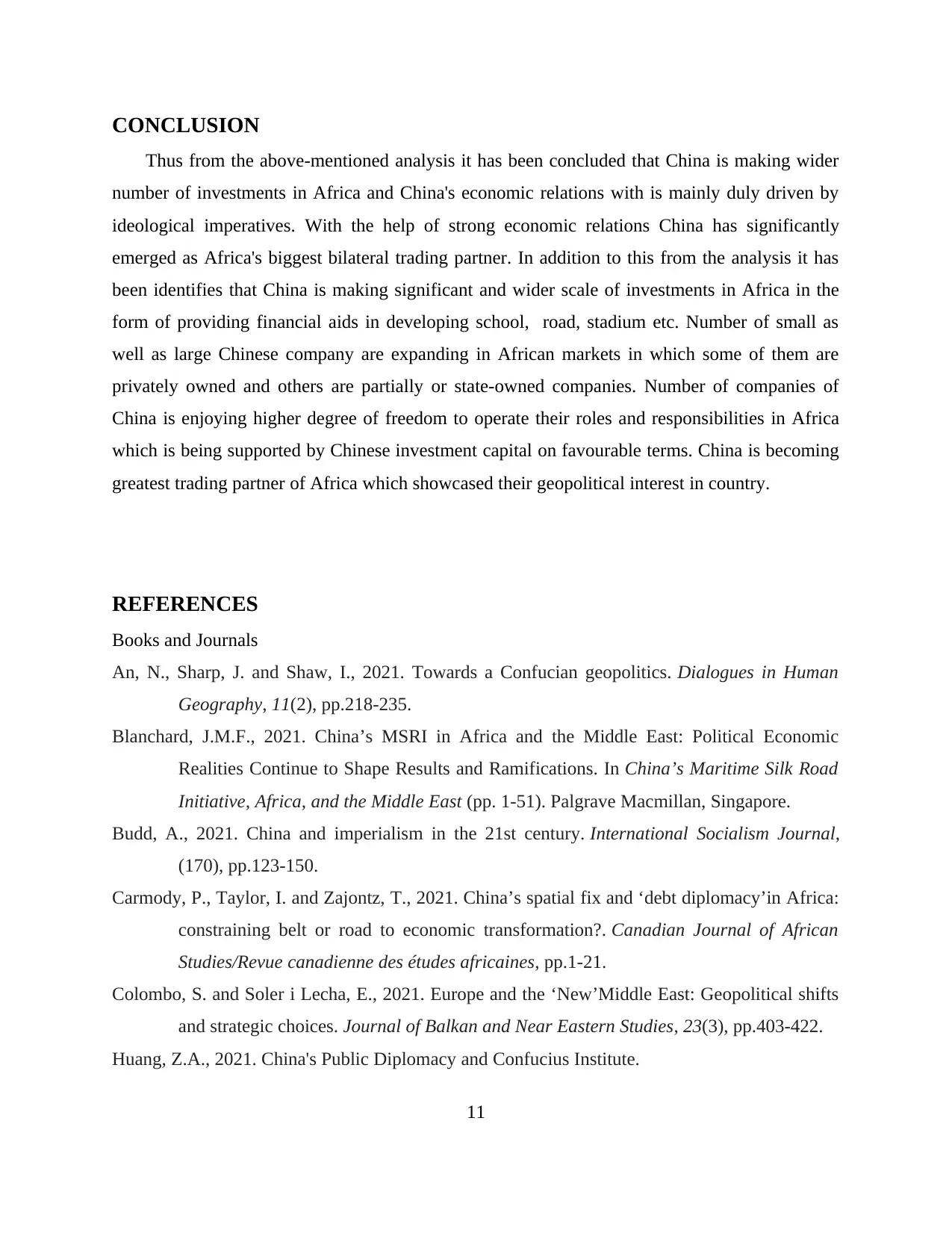
CONCLUSION
Thus from the above-mentioned analysis it has been concluded that China is making wider
number of investments in Africa and China's economic relations with is mainly duly driven by
ideological imperatives. With the help of strong economic relations China has significantly
emerged as Africa's biggest bilateral trading partner. In addition to this from the analysis it has
been identifies that China is making significant and wider scale of investments in Africa in the
form of providing financial aids in developing school, road, stadium etc. Number of small as
well as large Chinese company are expanding in African markets in which some of them are
privately owned and others are partially or state-owned companies. Number of companies of
China is enjoying higher degree of freedom to operate their roles and responsibilities in Africa
which is being supported by Chinese investment capital on favourable terms. China is becoming
greatest trading partner of Africa which showcased their geopolitical interest in country.
REFERENCES
Books and Journals
An, N., Sharp, J. and Shaw, I., 2021. Towards a Confucian geopolitics. Dialogues in Human
Geography, 11(2), pp.218-235.
Blanchard, J.M.F., 2021. China’s MSRI in Africa and the Middle East: Political Economic
Realities Continue to Shape Results and Ramifications. In China’s Maritime Silk Road
Initiative, Africa, and the Middle East (pp. 1-51). Palgrave Macmillan, Singapore.
Budd, A., 2021. China and imperialism in the 21st century. International Socialism Journal,
(170), pp.123-150.
Carmody, P., Taylor, I. and Zajontz, T., 2021. China’s spatial fix and ‘debt diplomacy’in Africa:
constraining belt or road to economic transformation?. Canadian Journal of African
Studies/Revue canadienne des études africaines, pp.1-21.
Colombo, S. and Soler i Lecha, E., 2021. Europe and the ‘New’Middle East: Geopolitical shifts
and strategic choices. Journal of Balkan and Near Eastern Studies, 23(3), pp.403-422.
Huang, Z.A., 2021. China's Public Diplomacy and Confucius Institute.
11
Thus from the above-mentioned analysis it has been concluded that China is making wider
number of investments in Africa and China's economic relations with is mainly duly driven by
ideological imperatives. With the help of strong economic relations China has significantly
emerged as Africa's biggest bilateral trading partner. In addition to this from the analysis it has
been identifies that China is making significant and wider scale of investments in Africa in the
form of providing financial aids in developing school, road, stadium etc. Number of small as
well as large Chinese company are expanding in African markets in which some of them are
privately owned and others are partially or state-owned companies. Number of companies of
China is enjoying higher degree of freedom to operate their roles and responsibilities in Africa
which is being supported by Chinese investment capital on favourable terms. China is becoming
greatest trading partner of Africa which showcased their geopolitical interest in country.
REFERENCES
Books and Journals
An, N., Sharp, J. and Shaw, I., 2021. Towards a Confucian geopolitics. Dialogues in Human
Geography, 11(2), pp.218-235.
Blanchard, J.M.F., 2021. China’s MSRI in Africa and the Middle East: Political Economic
Realities Continue to Shape Results and Ramifications. In China’s Maritime Silk Road
Initiative, Africa, and the Middle East (pp. 1-51). Palgrave Macmillan, Singapore.
Budd, A., 2021. China and imperialism in the 21st century. International Socialism Journal,
(170), pp.123-150.
Carmody, P., Taylor, I. and Zajontz, T., 2021. China’s spatial fix and ‘debt diplomacy’in Africa:
constraining belt or road to economic transformation?. Canadian Journal of African
Studies/Revue canadienne des études africaines, pp.1-21.
Colombo, S. and Soler i Lecha, E., 2021. Europe and the ‘New’Middle East: Geopolitical shifts
and strategic choices. Journal of Balkan and Near Eastern Studies, 23(3), pp.403-422.
Huang, Z.A., 2021. China's Public Diplomacy and Confucius Institute.
11
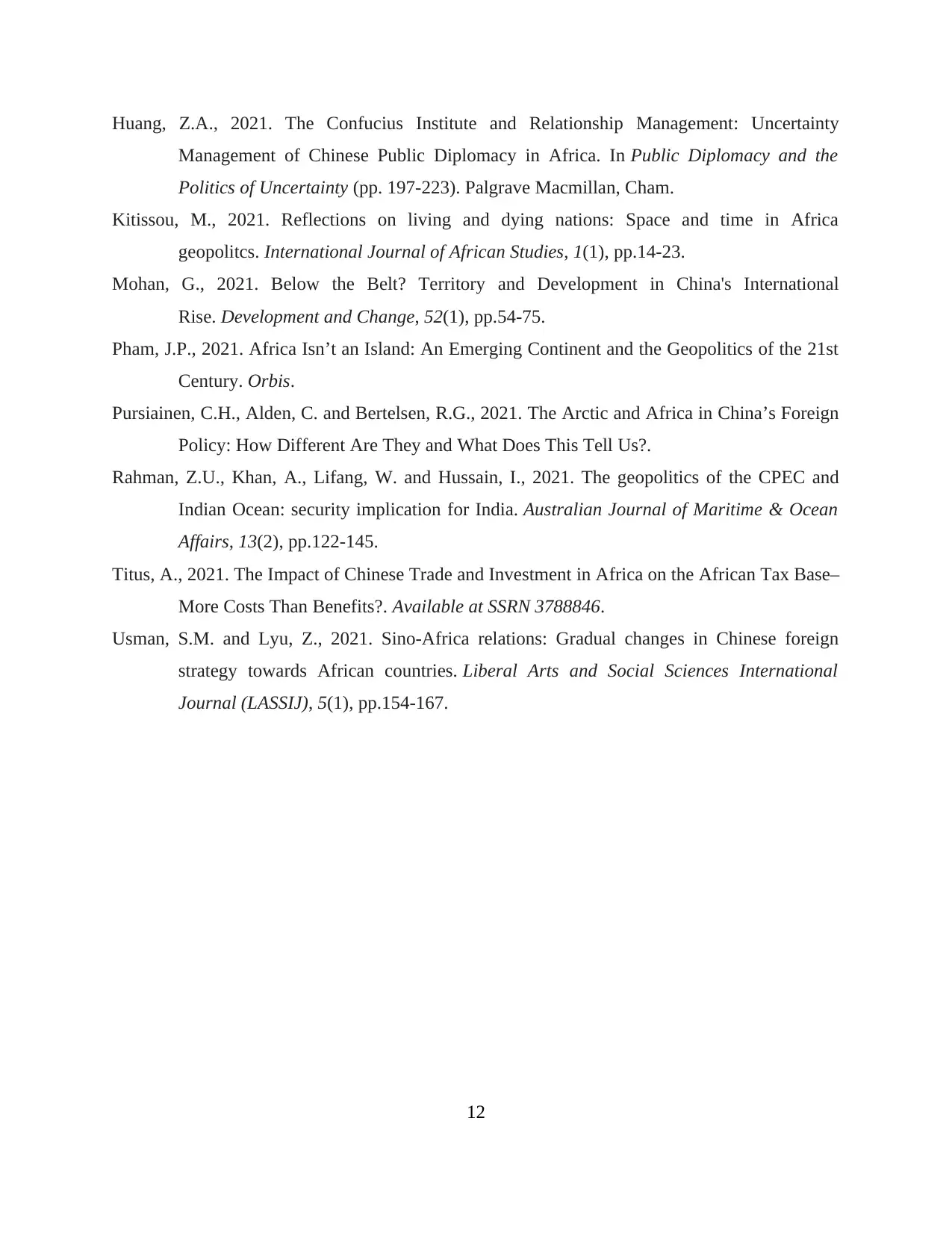
Huang, Z.A., 2021. The Confucius Institute and Relationship Management: Uncertainty
Management of Chinese Public Diplomacy in Africa. In Public Diplomacy and the
Politics of Uncertainty (pp. 197-223). Palgrave Macmillan, Cham.
Kitissou, M., 2021. Reflections on living and dying nations: Space and time in Africa
geopolitcs. International Journal of African Studies, 1(1), pp.14-23.
Mohan, G., 2021. Below the Belt? Territory and Development in China's International
Rise. Development and Change, 52(1), pp.54-75.
Pham, J.P., 2021. Africa Isn’t an Island: An Emerging Continent and the Geopolitics of the 21st
Century. Orbis.
Pursiainen, C.H., Alden, C. and Bertelsen, R.G., 2021. The Arctic and Africa in China’s Foreign
Policy: How Different Are They and What Does This Tell Us?.
Rahman, Z.U., Khan, A., Lifang, W. and Hussain, I., 2021. The geopolitics of the CPEC and
Indian Ocean: security implication for India. Australian Journal of Maritime & Ocean
Affairs, 13(2), pp.122-145.
Titus, A., 2021. The Impact of Chinese Trade and Investment in Africa on the African Tax Base–
More Costs Than Benefits?. Available at SSRN 3788846.
Usman, S.M. and Lyu, Z., 2021. Sino-Africa relations: Gradual changes in Chinese foreign
strategy towards African countries. Liberal Arts and Social Sciences International
Journal (LASSIJ), 5(1), pp.154-167.
12
Management of Chinese Public Diplomacy in Africa. In Public Diplomacy and the
Politics of Uncertainty (pp. 197-223). Palgrave Macmillan, Cham.
Kitissou, M., 2021. Reflections on living and dying nations: Space and time in Africa
geopolitcs. International Journal of African Studies, 1(1), pp.14-23.
Mohan, G., 2021. Below the Belt? Territory and Development in China's International
Rise. Development and Change, 52(1), pp.54-75.
Pham, J.P., 2021. Africa Isn’t an Island: An Emerging Continent and the Geopolitics of the 21st
Century. Orbis.
Pursiainen, C.H., Alden, C. and Bertelsen, R.G., 2021. The Arctic and Africa in China’s Foreign
Policy: How Different Are They and What Does This Tell Us?.
Rahman, Z.U., Khan, A., Lifang, W. and Hussain, I., 2021. The geopolitics of the CPEC and
Indian Ocean: security implication for India. Australian Journal of Maritime & Ocean
Affairs, 13(2), pp.122-145.
Titus, A., 2021. The Impact of Chinese Trade and Investment in Africa on the African Tax Base–
More Costs Than Benefits?. Available at SSRN 3788846.
Usman, S.M. and Lyu, Z., 2021. Sino-Africa relations: Gradual changes in Chinese foreign
strategy towards African countries. Liberal Arts and Social Sciences International
Journal (LASSIJ), 5(1), pp.154-167.
12
⊘ This is a preview!⊘
Do you want full access?
Subscribe today to unlock all pages.

Trusted by 1+ million students worldwide
1 out of 12
Related Documents
Your All-in-One AI-Powered Toolkit for Academic Success.
+13062052269
info@desklib.com
Available 24*7 on WhatsApp / Email
![[object Object]](/_next/static/media/star-bottom.7253800d.svg)
Unlock your academic potential
Copyright © 2020–2026 A2Z Services. All Rights Reserved. Developed and managed by ZUCOL.





